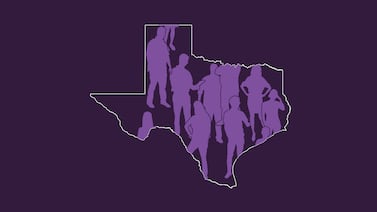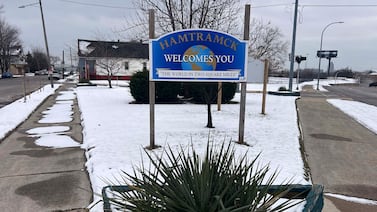Votebeat is a nonprofit news organization reporting on voting access and election administration across the U.S. Sign up for our free newsletters here.
Responsibility for running elections in Kerr County has shifted among three different people in the past two months. The first two officials bailed on the job after a months-long effort by one Republican county official to rid the county of electronic voting equipment and begin hand counting all ballots. The push has divided the overwhelmingly Republican county — a verdant stretch of the Hill Country split by the Guadalupe River — and will cost taxpayers around $250,000 due to the many changeovers.
So far, the effort has failed. Still, Kerr County Republican Party Chair Paul Zohlen told Votebeat the effort — led largely by Republican County Commissioner Rich Paces — has “single-handedly taken a wrecking ball to one of the finest election departments in the state.”
“This had never happened before,” Zohlen said. “And now the county clerk will have to put together a team and impart the 10 to 15 years of experience they need by March of 2024.”
Until late August, elections in Kerr County, home to Kerrville and with a population of more than 50,000 people, were managed by the tax assessor’s office. Bob Reeves, a Republican elected to the role in 2018, told Votebeat he refused to continue the work because of the growing distrust in elections there, which made an already time-consuming, stressful, and low-paying job nearly impossible.
“I was put between a proverbial rock and a hard place,” Reeves said. The recent demands for hand counting stemming from baseless suspicions about the security of the current system, he said, made the work seem hopeless.
The duties, therefore, were transferred to Jackie Dowdy, the county clerk. She, too, refused and resigned her position entirely. Her chief deputy, Ian Collum, was appointed as interim clerk while the county conducts the search for her replacement. He and others in that department, which has not handled elections in more than a decade, will now be placed in charge of helping Kerr County’s 40,000 registered voters cast their ballots in 2024.
Fueled by misinformation and baseless claims that electronic voting equipment is manipulated to change election results, the push to hand count ballots in Kerr County is similar to other efforts happening across Texas and elsewhere. Communities that have recently embraced hand counting of ballots — a method that election administration experts have said and studies have shown is less accurate, more costly, and less secure — have become hotly divided. In some cases, such as Cochise County, Arizona, it has pushed election officials out of their jobs and fractured trust in local elections.
Experts told Votebeat it may take years to undo the chaos and to restore the erosion of trust in elections that the effort to hand count has created in Kerr and elsewhere.
“These communities are spending an incredible amount of time trying to solve a problem that doesn’t exist. And as a result, creating a whole series of new very real problems,” said Justin Grimmer, a professor in the department of political science and a senior fellow at the Hoover Institution at Stanford University who is currently conducting research on efforts to hand count ballots in counties across the country.
Only a small handful of counties in Texas — all with populations of fewer than 10,000 residents — hand count their election results. In West Texas’ Glasscock County, which has fewer than 800 registered voters, it made little sense to buy expensive equipment for a job that could easily be done by hand, for example. Their small numbers and short ballots allow these counties to complete and submit vote totals within 24 hours of the polls closing on Election Day.
Right now, the effort to hand count ballots in Kerr County has reached a stopping point. This fall, a vote to change the county’s counting process ahead of 2024 failed. But neither Paces nor county election officials believe this fight is over.
“This was just the first skirmish,” Paces told Votebeat.
Officials reach a breaking point
Behind a counter of clerks who help residents update their vehicle registration, their property taxes, file paperwork for various licenses and update their voter registration is Bob Reeves’ small office. It’s often hard to see the surface of his desk, covered as it is in stacks of paperwork. The bookcase behind him holds even more stacks — reflecting the amount of work Reeves has had to handle as the county’s tax assessor and election official, with multiple, back-to-back state-mandated deadlines he has to meet to fulfill both roles.
Reeves said that over the years he and his staff knew of some in the community with questions or perhaps a general distrust of the elections process. “But we always tried to the best of our ability to help people understand,” he said.
Defending the process, and his job, however, became a lot more difficult when the distrust came from someone like Paces, a man seated at the commissioners’ court dais.
In the past eight months, Reeves kept finding himself constantly having to pull away from the stacks of motor vehicle registration, property tax and elections paperwork he had to complete in order to prepare for the next commissioners court meeting where the voting equipment he uses would be questioned — often without regard for facts.
The prospect of hand counting put Reeves, he told Votebeat, in what he perceived to be legal jeopardy. If the county were sued over the results of a future election, or if a lawsuit questioned the accuracy of hand counting, he would not be able to defend the practice in a courtroom. He also had no confidence that hand counting could be done in the time set under law, which requires counties to report results 24 hours after polls close. He also would not be able to explain why commissioners disagreed on whether to trust electronic vote-counting equipment even though he says he has confidence in the machines.
“Without their unanimous support I could not do my job properly,” Reeves told Votebeat after he resigned his election duties in August. By law, unless the county creates an elections department and appoints an elections administrator, the county clerk must serve as the county elections officer. The Texas Election Code allows the county commissioners, however, to transfer the election administration duties from the clerk to the tax-assessor collector, if needed – and if both departments are in agreement — which Kerr County did in 2008.
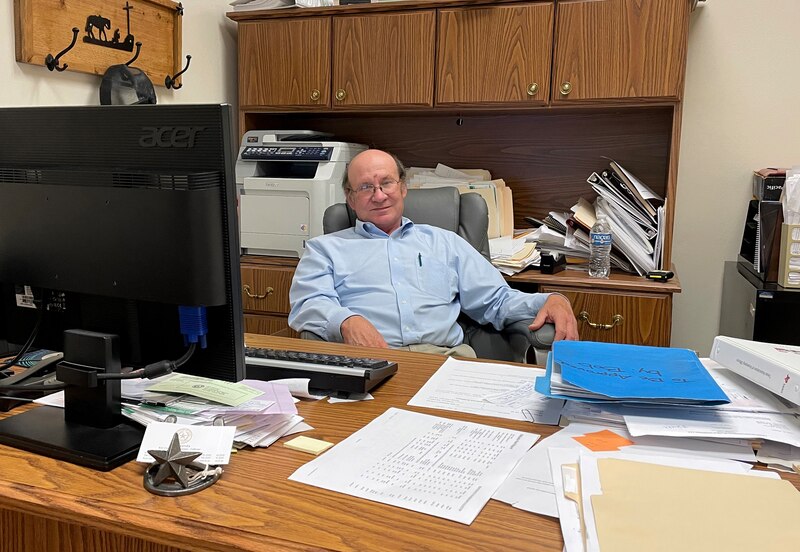
Jackie Dowdy, the county clerk who resigned in September, did not respond to Votebeat’s requests for comment about the reason behind her resignation. During a public meeting two weeks after Reeves announced he’d relinquish his duties, Dowdy appeared frustrated about the last-minute change to her department and said Reeves never reached out to her about his decision.
Under the transition plan for elections, Reeve’s office will continue to handle voter registration duties and only one of Reeves’ staffers would move over to Dowdy’s former department. “Having only one position move means I’ll only have one experienced person and that is not good,” Dowdy told the commissioners, requesting three additional staff members. “This is also going to affect the entire staff. I need space, I need desks, desktop computers, so, it’s an expense.”
The estimated cost the commissioners budgeted for such expenses comes to around $250,000, which will be borne by Kerr County taxpayers.
How the hand-count movement came to Kerr County
Paces ran for his seat on the Kerr County Commissioners Court last year with a campaign focused on frugal spending and election integrity. An Ohio native and retired engineer, Paces and his wife moved to the Texas Hill Country in the early 2000s.
After being on the job for less than a month, he began to receive text messages from local right-wing activist Alicia Bell, who said she was at the Capitol for an “election integrity legislative briefing.” The event featured Bob Hall, a Dallas-area senator who has for years pushed to eliminate electronic voting equipment; Texas GOP Vice Chair Dana Myers, who led efforts to remove Texas from an effective voter list maintenance tool; and Russ Ramsland, a Texas businessman who is widely known to spread false election conspiracies.
“Can you put voting on the agenda?” Bell asked Paces via text message, according to records obtained by the news outlet the Kerr County Lead and shared with Votebeat. “The whole presentation was jaw dropping.” Bell has been a thorn in the side of Kerr County government since she moved to the area from California. She’s a frequent speaker at commissioners court meetings who has denied that the COVID-19 pandemic is real and is against vaccine mandates.
“We are here to govern the local community. We’re not here to listen to what’s on the internet, or what’s on Fox News,” Kerr County Judge Rob Kelly — who declined Votebeat’s multiple requests for comment on this story — told Bell in 2021 after she claimed doctors were trying to scare the public by inflating positive cases of COVID-19. “I know you’re new from California, and you don’t understand how Texas local government works. We’re required to abide by and follow the law.”
Less than a month after Bell sent Paces that text message, in February, he added the topic of elections as an item on the commissioners court agenda. He proposed hosting an election integrity workshop, where the public and the other county commissioners could hear from “experts’’ first-hand.
The commissioners agreed to host the workshop, and the first took place in March at the county commissioners court. Reeves was asked to be on hand to explain the relevant laws and existing procedures, and a representative from Texas-based election machine vendor Hart Intercivic went over the company’s security features that protect voting machines from tampering. Then, Paces brought on Mark Cook, an election conspiracy theorist and self-described IT expert from Colorado who has for months without success tried to persuade Texas counties to get rid of their voting equipment while driving a branded RV from county to county. He’s been to Uvalde, Nueces, Bexar, Fort Bend, Montgomery, Denton and Gillespie Counties, among others, where county leaders and election officials have rejected his proposals.
Days after the event, Paces traveled to Waco for former president Donald Trump’s first 2024 presidential campaign rally.
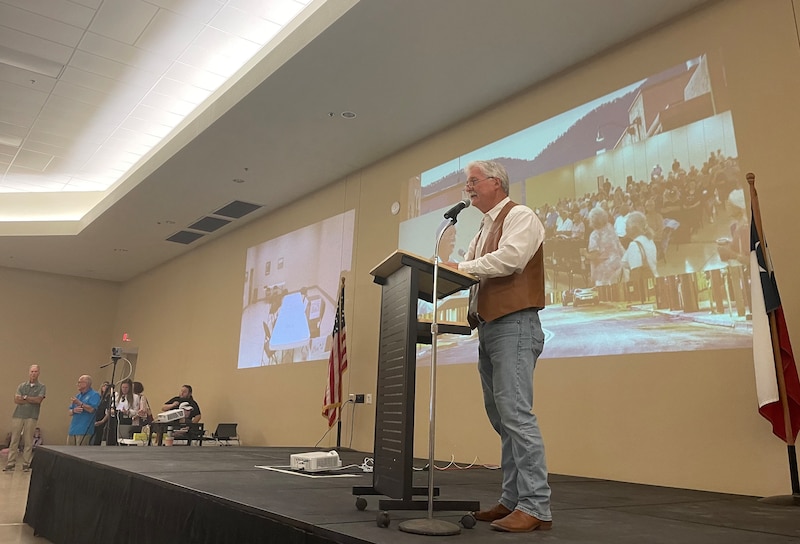
Meanwhile, Reeves tried other ways to show Paces and the other commissioners that hand-counting the ballots of the county’s more than 38,000 registered voters would not be feasible. With the help of county workers, Reeves tested how long it would take to count 100 ballots from Kerr County’s March 2020 Republican primary: “With fresh eyes, it took an hour to count 32 ballots,” Reeves said.
He also warned that the county already struggles to find enough election workers and the facilities for the 20 polling locations for each election. In order to hand count, the county would likely need to double the number of poll workers, the funds to pay them and larger spaces to conduct hand counts based on the number of ballots. “That’s more than 200 people that we’d need to work nonstop,” Reeves said.
None of the evidence Reeves or others showed to Paces changed his mind.
Right-wing celebrities draw a crowd
The records shared with Votebeat show that activists from local far-right political action committee We The People and other voter fraud activists from neighboring counties have helped drive this momentum. He also had the help of national names in the “election integrity” movement, such as Seth Keshel, that has grown out of the lies about the outcome of the 2020 election.
In August, around 300 people showed up to an Election Integrity Town Hall that Paces organized, packing the expo hall at the county’s fairgrounds in Kerrville. The event lasted nearly six hours.
Many were there to see Tina Peters, the former Mesa County Colorado clerk who was indicted last year on felony and misdemeanor charges related to election equipment tampering after she allowed unauthorized people break into her county’s election system in hopes of finding evidence of fraud. As she walked in, Peters received a standing ovation from the crowd of mostly senior citizens. The crowd fell silent when she took the stage, listening as she explained why the voting machines and government officials — including those who arrested her — could not be trusted. She also denied any wrongdoing on her part related to criminal charges against her, and provided no evidence that Kerr County’s elections were flawed.
“These are Democrats and Republicans, Marxists and globalists who want to take your country,” Peters said before promoting her website, her live streamed video show and an upcoming documentary about her. “They put the people in [office] that they want. They are selected, not elected.”
Other speakers included Keshel, Hall, and Cook, who is connected to self-proclaimed “election integrity” groups across the country, and to clerks who have tried to illegally obtain access to voting systems. He described hand counting as a type of salvation for towns seeking to boost election confidence.
Cook told the crowd that government and election officials are using electronic voting equipment to tally votes because “they think we, the citizens, the peasants are too dumb to count their own votes. Not anymore,” Cook said. The crowd cheered, with a handful of onlookers shouting “Amen!”
Records show Paces arranged travel and personally paid expenses for Peters and Cook. Both stayed as guests in his home east of the county.
In September, he formally proposed the county hand count ballots for the upcoming November general election.
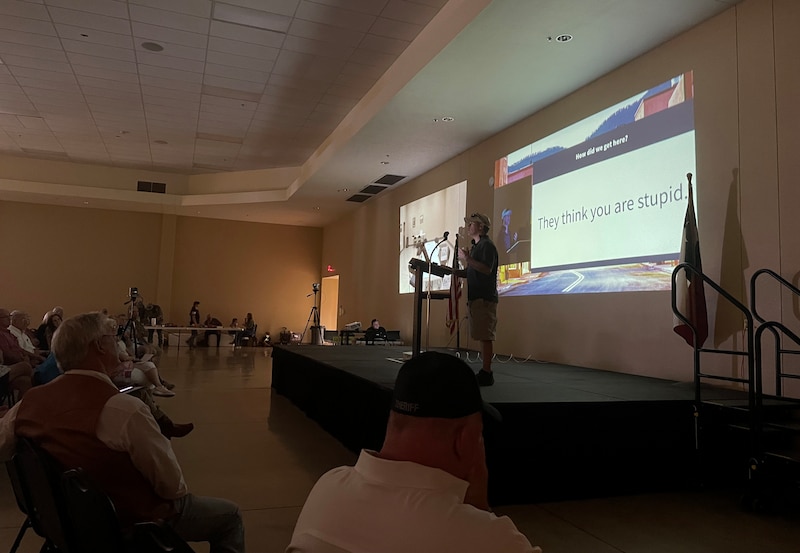
The vote failed to move forward after no other commissioners, also all Republicans, would second the motion. Its failure, though, was not indicative of a lack of enthusiasm in the county — the room was filled to capacity, and more waited outside the room in order to be heard on the measure.
Most of those who showed up to speak were Republicans — 75% of the county voted for former President Donald Trump in 2020. They were divided by the prospect of hand counting ballots.
Bill Ragsdale, a Kerr County justice of the peace, reminded those present that hand counting will slow the process tremendously, potentially impacting the entire state of Texas. In the 80s, he said, he assisted during an election where “Kerr County held up the entire state’s election for three days because we were hand-counting,” he said. “[Counters] worked all night long, through the next day and through the next day to try and count all the votes. Know how accurate that count was? I don’t know. We were all ready for it to be over.”
For those in favor of hand counting, objections about cost and time didn’t make much of a difference. “There is no trust right now in our current system and we need to fix that,” said Roger Hall, a resident of Ingram who told the crowd he was in favor of hand counting and did not trust voting machines. “That’s what a lot of people here today are here for.”
Paces has also taken this show on the road.
In Medina County, a small county two hours south of Kerr County, he and Cook took the stage days after his August event in Kerr, to advocate they, too, take up hand counting. Paces, who has never worked an election, led a group of people to demonstrate how a hand count would be done. Four people sat around a table and pulled out ballots from cardboard bankers boxes and started tallying.
Paces encouraged those who attended the demonstration to gather around the table to see how it’s done up close. “You’ll see this is very transparent,” he told the crowd and reassured them the counting would be done quickly.
“My plan is to have people come in to start counting ballots at 2 in the afternoon. Five hours worth. You’re done by the time the polls close. It’s a matter of getting enough people,” he said.
It’s not clear what Paces’ next move is, though he told Votebeat he is committed to enacting this change, regardless of the damage it does to the county. He rejects the assertion that hand counting would cost more money and take substantially more time with less confidence in the final results, despite having no supporting evidence to offer. He says he’d gotten hundreds of people signed up to volunteer to hand count in Kerr.
“And more people are calling me and telling me, ‘hey, sorry it didn’t work, but I’ll hand count, put me on the list,’ and more will come forward,” Paces said. “It’s almost like a movement of civic pride, and that’s great.”
Correction, Oct. 13, 2023: An earlier version of this article misspelled the name of the Kerr County deputy clerk. His name is Ian Collum.
Natalia Contreras covers election administration and voting access for Votebeat in partnership with the Texas Tribune. Contact Natalia at ncontreras@votebeat.org



